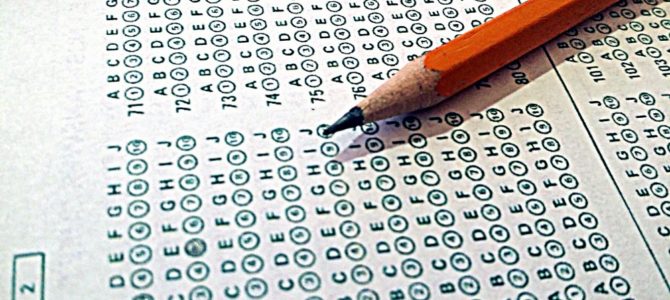
A proposal recently released by The National Association of Basketball Coaches requests the NCAA remove an eligibility requirement to submit SAT or ACT scores. In the proposal, put forth by the Committee on Racial Reconciliation, the NABC decries the two tests as wicked forces of institutional racism that should be “jettisoned for that reason alone.” The committee was formed last month, and the proposal shows it.
Their argument runs like this: the SAT was created in 1926 by the eugenicist Carl Brigham. Brigham intended the test to demonstrate the racial superiority of white blood. His project, of course, failed.
Brigham himself admitted that the test did not measure innate ability but “a composite including schooling, family background, and familiarity with English.” Unsurprisingly, Brigham’s conclusion is rather convenient for his position. It does not admit that black students contain the capacity to succeed, nor does it admit that white students are not innately superior, only accidentally. In other words, Brigham lamented that his test was not racist enough.
The NABC, however, takes Brigham’s admission of failure as proof that the SAT is inherently racist. Their attempts to defend this claim are laughably simplistic:
On average, Asian American students score highest on both these tests…with whites scoring next highest…Asian American students are only a tiny 8 percent of all SAT & ACT test-takers, and likely a much smaller percentage of student-athletes. Whites constitute by far the largest group of test-takers, so overall, whites benefit the most from the SAT and ACT.
Note, first, that they could not bother to look up what percentage of student-athletes are Asian American. Presumably, this would be an important part of their argument.
Furthermore, it is worth pointing out the NABC’s limited understanding of statistics. The final sentence in the above quote claims that because whites are the largest group of test-takers, whites benefit the most from the SAT and ACT. By similar reasoning, whites unconscionably benefit more from cars, social security, and public transit. Would the NABC prefer a system that allows whites to be explicitly discriminated against?
Their difficulty applying percentages continues in the very next paragraph:
There are high-scoring students from all subgroups; however, the number of high-scoring African American, Latinx, and Native American students is very small.
There are several reasons this constitutes a bad and faulty argument. First, it moves the goalposts of the argument. Predominantly, the coaches have discussed the SAT and ACT as eligibility tools, a conversation has more to do with determining the lowest acceptable score, not how many students are among the top percentiles.
Further, it fails to follow the basic rule of percentages they just used. Of course, the number of high-scoring minorities is small. A small percentage of a small percentage will quite often be a small number.
Even taking their argument in good faith, the SAT’s reported statistics don’t indicate a test that successfully promotes white supremacy. For instance, 25 percent of Asian students who took the SAT in 2019 scored above 1400. Only 8 percent of white students scored in the same range, while 1.7 percent of the three demographics the coaches listed scored above 1400.
These statistics indicate an achievement gap, but it is worth noting that 1.7 percent is much closer to 8 percent than 8 percent is to 25 percent. Clearly, the test is not benefitting exclusively white students, as the NABC proposal claims.
Nevertheless, the NABC shouldn’t be concerned about top scorers. Eligibility is concerned with the lower bound, not the upper. If the SAT is an agent of institutional racism, we should expect the SAT to prevent black students and other minorities from becoming college athletes. The statistics indicate no such barrier.
Here is where it becomes clear why the coaches didn’t include demographic numbers earlier. According to statistics from the NCAA, blacks make up 21 percent of college athletes at the Division I level, despite making up only 13 percent of the US population, according to the U.S. Census. Comparatively, whites represent 56 percent of Division-I athletes, even though the nation is 76 percent white.
Surely, if the SAT was at all successful at suppressing the ability of black athletes to attend college, blacks would not be so greatly overrepresented as a percentage of the population of college athletes. One would think these percentages were a positive thing.
The NABC would like to remove the minimum standard of SAT and ACT scores from eligibility considerations so they can enroll an even greater number of athletically gifted but academically ill-prepared students — all while academic misconduct scandals seem to pop up every year to great public outrage. These scandals grow from the avarice of universities, their financial boosters, and their athletic departments. Most of these scandals start when coaches or administrators try to protect the eligibility of high-level athletes who bring in millions of dollars in revenue for all involved (except the athletes, of course).
The proposal also extols the immeasurable value of receiving a bachelor’s degree and the need to increase minority access to higher institutions. Yet, once a student arrives on campus, he is under the near authoritarian power of his coach. These same coaches who want freer access for students also defend their right to prevent their athletes from transferring to other schools in the name of “roster control.” Coaches tend to forget about freedom and opportunity when it’s inconvenient.
If, as the NABC claims, test score requirements have remained constant while graduation rates rose, that does not suggest the tests are unnecessary — it suggests a standardized test adequately measured the college readiness of student-athletes. The NCAA would not be supporting a racist institution by requiring an objective measure of academic readiness. It would be upholding the status of college athletes as students.
Given the number of colleges and universities waving the SAT requirement for general admission purposes, the NABC is within reason to ask the NCAA to wave the test as a requirement for this year’s incoming class. What isn’t merited is their hyperbolic indignation that the SAT is unfairly holding back minority athletes.
The author has written for The Federalist before and here writes anonymously to protect his job in education.









